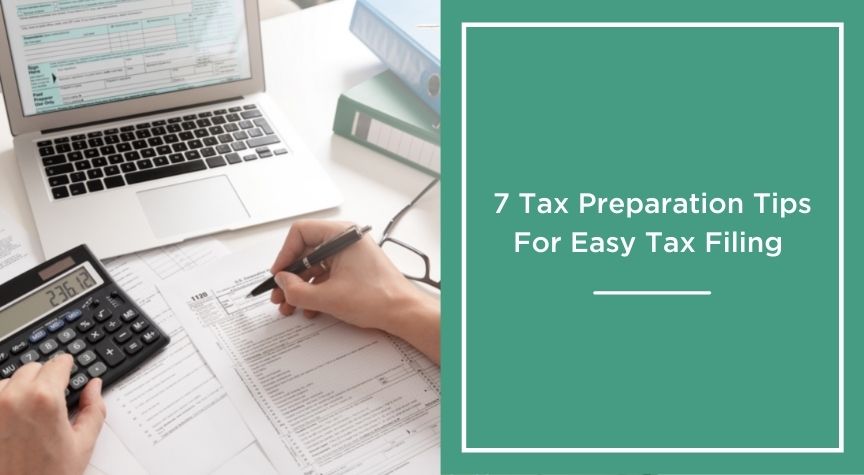There aren’t a lot of people in the country that get excited about tax season rolling around – even if you expect to get a refund from the IRS!
Always filled with stress, frustration, and at least a little bit of anxiety, tackling taxes is never a walk in the park.
With the help of the seven tips and tricks we break down below, though, you’ll be able to move through this process a lot faster. On top of that, you’ll be able to eliminate a lot of hassle, a lot of headache, and a lot of heartache along the way.
Let’s get right into it, shall we?
Square Away Your Financial Documents Early in the Year
Scrambling for your financial documents, your income information, and details regarding your investments at the last minute will always introduce a lot of stress and a lot of anxiety.
At the same time, doing your taxes without all of this info is next to impossible.
By committing to squaring your financial documents away early in the year (January or February is best) you give yourself plenty of time to make sure that your records are complete, accurate, and organized.
That’ll help you hit the ground running when you need to fill out your tax information.
Make sure you have income reports (W-2s, 1099s, K-1s, etc.), investment information, business details (including Schedule C of Form 1040), and any information or receipts you have for deductions, too.
Run Through Your Previous Tax Filings
Around March or so you’ll also want to run through a couple of years of your previous tax filings, just to sort of re-familiarize yourself with the process.
The overwhelming majority of people aren’t going to have their tax information change that much from one year to the next. By reviewing your previous tax filings you’re able to get a mental jumpstart on the process moving forward, but you also make sure that you don’t overlook areas on your current taxes that you made sure to square away previously.
Interest and dividends, capital loss carry forward balances, different types of tax deductions, etc. can all fall through the cracks if you aren’t reviewing your previous documents before you get started.
Max Out Your IRA and Tax Protected Accounts
If you have an opportunity to squirrel away money into your tax-protected accounts (something like an IRA, for example) you’re going to want to make sure that you have maxed it out before you file your taxes.
You won’t be able to use this neat little trick on your 401(k) or a 403(b), but stuffing money into your IRA and protecting it from the taxman is always a savvy move that’ll help you today when filing your taxes and in the future when retirement rolls around!
Lean on Software to Handling Your Tax Paperwork Heavy Lifting
There are some amazing pieces of software out there that can handle the bulk of the heavy lifting for you when it comes time to file your taxes, and you’ll want to use those solutions as much as possible.
TurboTax, H&R Block, and even the IRS themselves offer software solutions that automate and streamline the filing process significantly.
Running through the tax forms physically is definitely an option. But with so many sophisticated tax solution tools out there you’d have to be at least a little bit crazy not to save time, money, and energy by ignoring them.
Do a Bit of Research on Any New Changes
As highlighted a moment ago, the overwhelming majority of tax situations aren’t going to change all that much from one year to another.
Every now and again, however, new rules, new changes, and new methods of filing are introduced – or your financial situation may have changed, too.
Do a bit of research into any changes that might impact your tax situation before you start to file and you’ll clear up a lot of frustration later down the line.
Get Your Taxes in Early
If possible, try to get your tax filing in as soon as possible – particularly if you are expecting a tax return.
Employers, financial institutions, and other organizations that have tax forms for individuals are legally required to have those documents in the mail no later than January 31.
This means that by the first or second week of February you should have all the information you need to file your taxes, and you’ll want to jump right in ASAP.
The faster you file, the faster you get your refund – and the faster you can stuff that money into an investment account or put it to good use.
Of course, if you owe money you might want to delay until April 15 (or as long as possible). But that’s something you’ll want to discuss with a tax attorney, accountant, or tax strategist.
Lay the Groundwork for Next Year, Too
Finally, it’s never a bad idea to start squaring away your financial information for next year’s tax season.
Laying down the groundwork, getting your financial information in order, and streamlining the process for next year now guarantees that the 2022 tax season will be a whole lot less stressful.
Take advantage of all seven tips we’ve included in this guide and tax season won’t ever be the stressful, nightmare scenario for you that it can be for millions of people around the country!
Tax Accounting Services For Businesses
We’d love to sit down and talk about your tax situation and how you can protect as much of your income as possible – legally, ethically, and responsibly.
If you’d like personalized help for navigating the often confusing tax situation post-coronavirus, please don’t hesitate Robert Hall & Associates at your earliest convenience via the webform here, by phone at 818-242-4888 or reach me directly via email at [email protected].





















